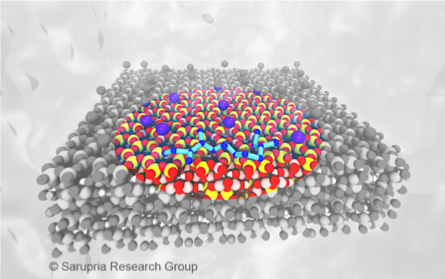Professor Sapna Sarupria
Professor Sapna Sarupria
Department of Chemical & Biomolecular Engineering
Clemson University
Host: Professor Ilja Siepmann
Abstract
Nano-diving into the clouds: Uncovering molecular mechanisms of heterogeneous ice nucleation
The presence of particles such as dust and pollen affect cloud microphysics significantly through their effect on the state of water. These particles can hinder or accelerate the liquid-to-solid transition of water, and also affect the ice polymorph formed in the clouds. This indirectly cloud reflectivity, cloud lifetime, and precipitation rates. While a predominant phenomenon, the understanding of the surface factors that affect ice nucleation is minimal. In our research, we use molecular simulations to illuminate the pathways through which surface properties influence ice nucleation. Experiments cannot probe the length and time scales relevant to nucleation. While molecular simulations, in principle, can probe the length and time scales of nucleation, in practice nucleation is challenging to sample. Nucleation is often associated with large free energy barriers and thus, is difficult to sample in straightforward simulations. Advanced sampling techniques and other creative approaches are needed. In this talk, I will discuss the insights we have obtained on heterogeneous ice nucleation through studies of three surfaces – silver iodide, kaolinite and mica. I will also highlight the synergistic combination of experiments and simulations in understanding heterogeneous ice nucleation. I will introduce a recently developed method in our group that facilitates computational studies of heterogeneous nucleation. I will conclude by providing a perspective on the broader implications of our studies on interfacial phenomena and surface design.

Professor Sarupria
Sapna Sarupria is an associate professor in Chemical and Biomolecular Engineering at Clemson University. She received her Master's degree from Texas A & M University where her thesis focused on thermodynamic modeling of clathrate hydrates of gas mixtures formed in the presence of electrolyte solutions. She obtained her doctorate from Rensselaer Polytechnic Institute, where she studied pressure effects on water-mediated interactions and proteins. She was a postdoctoral researcher in Princeton University and studied hydrate and ice nucleation using advanced path sampling techniques. She received the NSF CAREER award, ACS COMP Outstanding Junior Faculty Award and Clemson’s Board of Trustees Award of Excellence. She is an active member of Women in Chemical Engineering (WIC) and Computational and Molecular Science and Engineering Forum (CoMSEF) in AIChE.
Research
Professor Sarupria's research focuses on surface-driven phenomena. Current projects include heterogeneous ice nucleation, protein adsorption on surfaces and fouling on water purification membranes. The central theme in Sarupria group involves developing cutting-edge sampling techniques in molecular simulations and applying them in understand long standing problems in condensed matter. We recently developed novel transition path sampling methods and software to enable their large-scale implementation in HPC infrastructure. These methods will be used to study ice nucleation, and reactions in condensed phases including enzymatic reactions.
